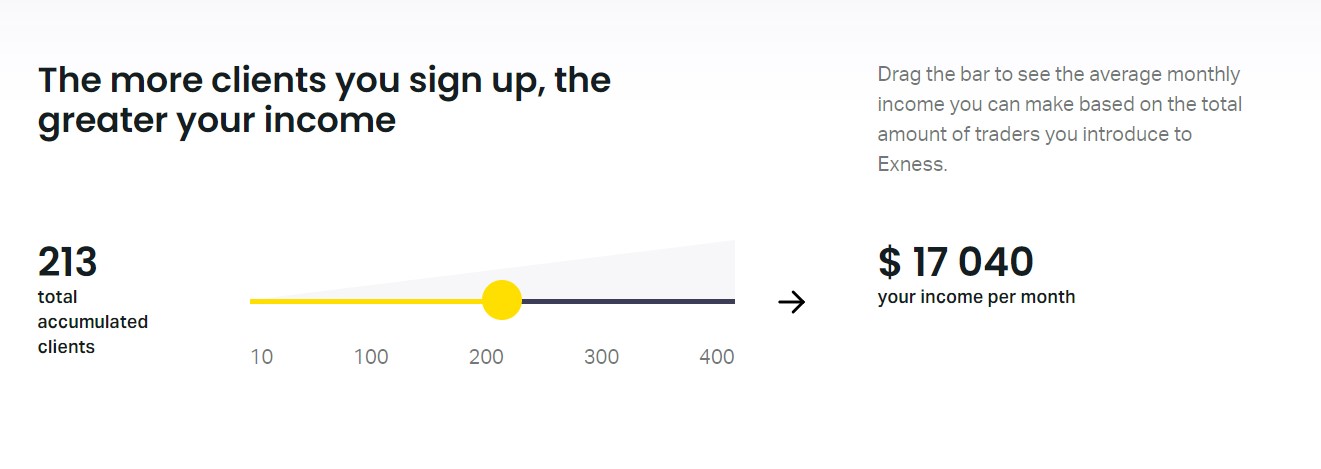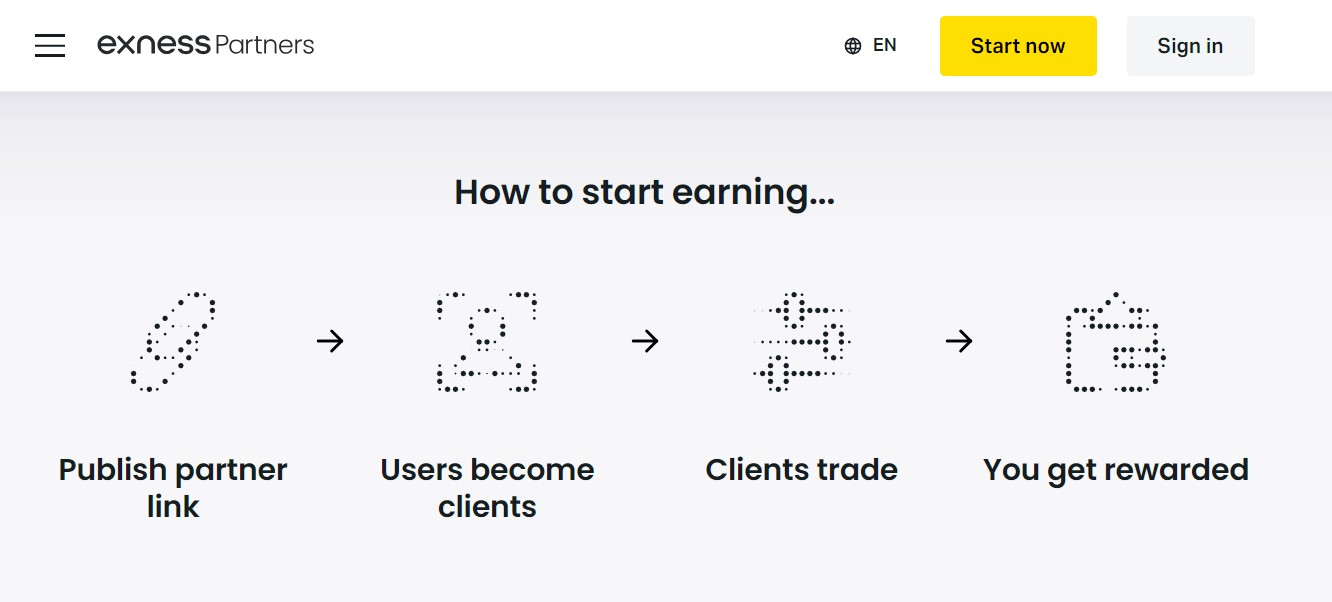
7 minute read
What are Exness IB Commission Rates?
Exness offers an attractive commission structure for its Introducing Brokers (IBs). These commission rates allow brokers to earn money by referring clients to Exness, making it a popular partnership model for both individuals and firms. Understanding how these commissions work is crucial for anyone considering becoming an IB with Exness. In this article, we’ll dive into the details of Exness IB commission rates, how to calculate them, and the benefits of being an IB.

🏆 Start Trading With Exness – Register Now! 🚀 or Visit the Broker’s Website ⭐
Understanding IB (Introducing Broker) Programs at Exness
An Introducing Broker (IB) is an individual or entity that refers clients to a broker like Exness in exchange for a commission. This type of partnership is popular because it allows the IB to earn passive income by simply bringing in clients who will trade on the Exness platform.
The role of an IB is to connect new traders to Exness, often by offering them educational resources, support, or simply recommending Exness as a trusted trading platform. Once the clients sign up and begin trading, the IB earns a commission based on the trading volume generated by those clients.
Exness’s IB program is designed to be flexible, offering competitive commission rates and the ability to earn based on the activity of referred clients. This program is open to both individuals and businesses, giving anyone with a network the potential to profit.
Exness IB Commission Rates Explained
Exness offers IBs a competitive commission structure, but the exact rates can vary depending on several factors. These factors include the account type chosen by the IB, the volume of trades generated by their clients, and the specific instruments being traded.
In general, Exness provides two types of commission structures for IBs:
Revenue Share Model: IBs earn a share of the spread or commissions charged to their referred clients. This model typically results in recurring commissions as long as the clients remain active.
CPA (Cost Per Acquisition) Model: IBs receive a fixed commission for each new client they refer who meets certain criteria, such as making their first deposit.
The rates vary based on the trading activity of the referred clients. Higher trading volumes generally result in higher commissions, meaning IBs can earn more as their clients trade more frequently.
Exness also offers transparency in its commission structure, providing IBs with clear guidelines on how much they can expect to earn from different client activities.

How to Calculate Exness IB Commissions
Calculating your Exness IB commissions is relatively straightforward, but it depends on the structure of your partnership agreement. Here’s a simple guide to understanding how commissions are calculated for both revenue share and CPA models:
Revenue Share Model:IBs earn a percentage of the spread or commission that Exness charges their referred clients. For example, if an IB refers a client who trades 100 lots and generates $500 in commission for Exness, the IB might earn a percentage of that amount, say 40%. This would mean the IB earns $200 in commission for that client’s trades.
CPA Model:In this model, an IB earns a fixed commission for each new client they refer who meets the conditions set by Exness (e.g., making a first deposit). For instance, an IB might earn $50 per client who deposits at least $100 and starts trading. The total commission would depend on how many new clients the IB refers.
It's important to keep track of the trading activity of the clients you refer to understand your earnings potential. Exness offers a dashboard where IBs can monitor their referred clients’ activity and commissions in real-time.
Benefits of Being an Exness IB
Becoming an Introducing Broker (IB) with Exness comes with several key advantages. First and foremost, Exness offers some of the most competitive commission rates in the industry, making it a highly profitable partnership for individuals or businesses with a network of potential traders. Whether you are a small-scale IB or manage a large network, Exness provides scalable opportunities to grow your income as your referral base expands.
Another benefit is the flexibility Exness offers to IBs in terms of commission models. You can choose between the revenue share model or the CPA (Cost Per Acquisition) model, depending on what aligns best with your business strategy. This allows you to tailor your earning potential to suit the needs of your clients.
Exness also provides excellent support for its IBs, including marketing materials, educational resources, and a user-friendly dashboard to track referrals and commissions. As an IB, you also benefit from the broker's strong global reputation and regulatory compliance, which makes it easier to attract new clients.

🏆 Start Trading With Exness – Register Now! 🚀 or Visit the Broker’s Website ⭐
How to Become an Exness IB
Becoming an Exness IB is a straightforward process. First, you’ll need to register for an Exness account if you don’t already have one. Once your account is set up, you can apply to become an IB through the Exness Personal Area.
Sign Up: Visit the Exness website and create an account. Ensure you provide all necessary information accurately.
Apply for IB Status: After logging in, go to the "Partnership" section in your Personal Area and select "Introducing Broker" as your preferred partnership type.
Verification Process: Exness will review your application and verify your details. This may include a brief verification process to confirm your identity and business legitimacy.
Start Referring Clients: Once approved, you can begin referring clients to Exness. You’ll have access to marketing materials and resources to help attract new traders.
Track Your Earnings: Exness provides an easy-to-use dashboard where you can track the activity of your referred clients and your commissions.
Once approved, you’ll be able to start earning commissions based on the activity of the clients you refer, making it a simple way to generate additional income.
Frequently Asked Questions About Exness IB Commission Rates
What is the average IB commission rate at Exness?
The average IB commission rate at Exness can vary depending on the account type, trading volume, and the model chosen by the IB (Revenue Share or CPA). Generally, commissions range from a percentage of the spread or commission on trades to a fixed fee per referred client. For a more precise figure, IBs can refer to the partnership agreement and their Exness Personal Area for customized commission rates based on their activity.
Are commissions the same for all account types?
No, Exness commissions can differ depending on the account type. For example, IBs may receive different commission rates for clients who trade on standard accounts compared to those using more specialized accounts, like Raw Spread or Zero accounts. The volume of trading and the instruments being traded also play a role in determining commission rates.
How often are IB commissions paid?
Exness pays IB commissions on a monthly basis. However, the exact payment schedule may depend on the IB's agreement and the terms set by Exness. Commissions are typically processed and credited to your account after the close of the trading month. You can view your earnings in real-time via your IB dashboard.
Can IBs track their referrals and earnings?
Yes, Exness provides IBs with a dashboard to track their referrals, monitor trading activity, and see real-time commission earnings. This allows IBs to stay up-to-date with their performance and adjust their strategies if needed. The dashboard provides detailed reports on referred clients, their trading volume, and the commissions generated.
Are there any hidden conditions in the IB program?
Exness is transparent about its IB program and its terms. There are no hidden conditions, and all fees, commissions, and requirements are clearly stated in the IB agreement. However, certain conditions may apply based on the account type or referral volume, which could affect commission rates or eligibility for specific bonuses. IBs should always review the partnership terms carefully to ensure full understanding.










